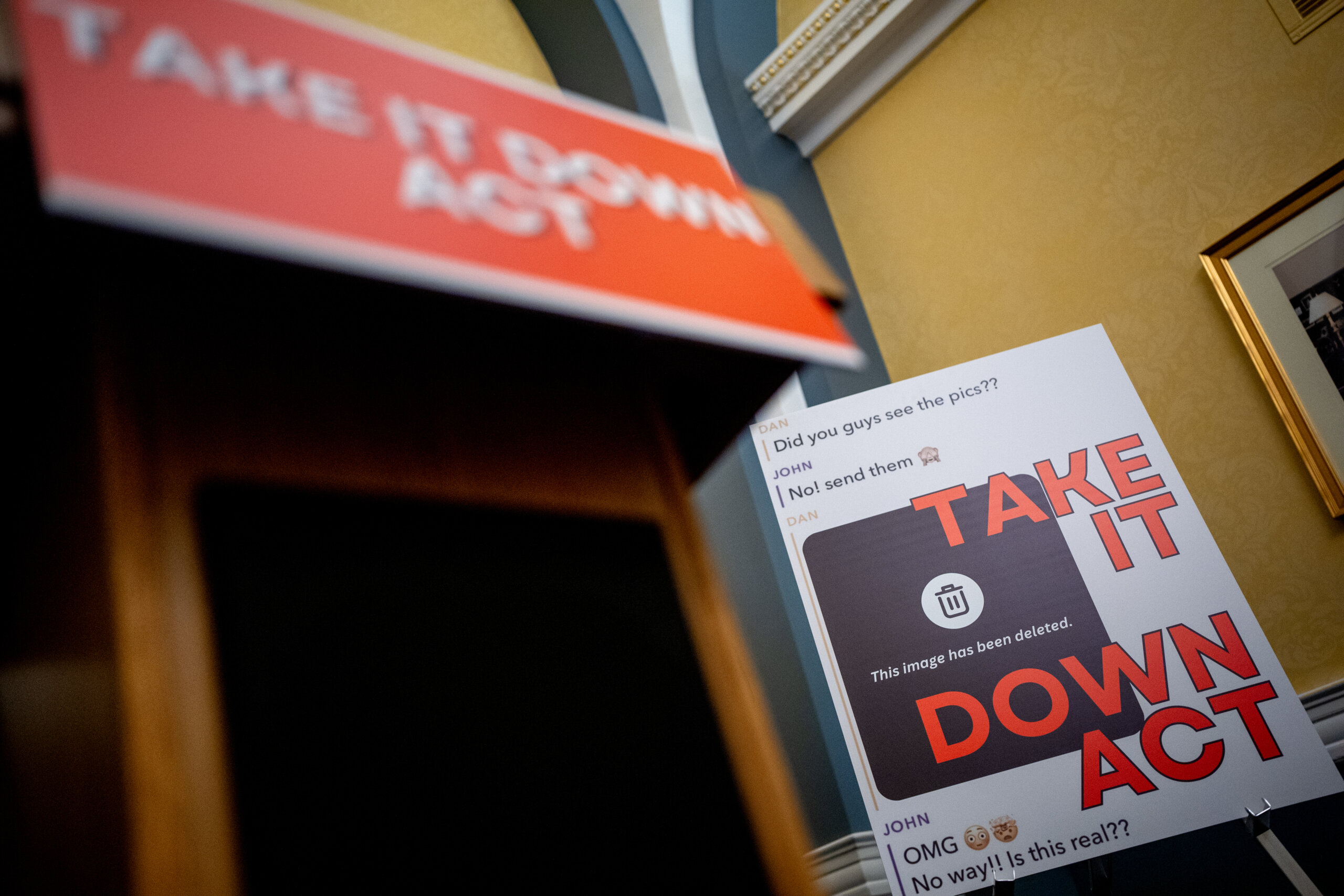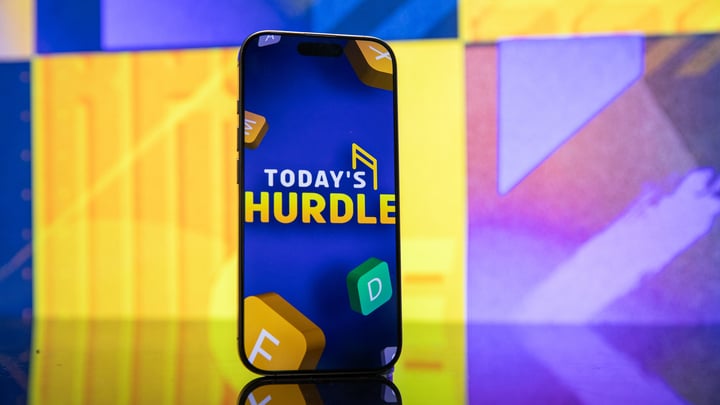Tech
Congress passes ‘Take It Down’ Act to fight AI-fueled deepfake pornography

Congress has passed a bill that forces tech companies to take action against certain deepfakes and revenge porn posted on their platforms.
In a 409-2 vote on Monday, the U.S. House of Representatives passed the "Take It Down" Act, which has received bipartisan support. The bill also received vocal support from celebrities and First Lady Melania Trump. The bill already passed the Senate in a vote last month.
The Take It Down Act will now be sent to President Donald Trump, who is expected to sign it into law.
First introduced by Republican Senator Ted Cruz and Democratic Senator Amy Klobuchar in 2024, the Take It Down Act would require that tech companies take quick action against nonconsensual intimate imagery. Platforms would be required to remove such content within 48 hours of a takedown request. The Federal Trade Commission could then sue platforms that do not comply with such requests.
In addition to targeting tech platforms, the Take It Down Act also carves out punishments, which include fines and potential jail time, for those who create and share such imagery. The new law would make it a federal crime to publish — or even threaten to publish — explicit nonconsensual images, which would include revenge porn and deepfake imagery generated with AI.
Digital rights groups have shared their concerns regarding the Take It Down Act. Activists have said that the bill could be weaponized to censor legally protected speech, and that legal content could be inaccurately flagged for removal.
Despite these concerns, the Take It Down Act even received support from the tech platforms it seeks to police, such as Snapchat and Roblox.
Congress isn't finished addressing AI and deepfakes this year either. Both the NO FAKES Act of 2025 and Content Origin Protection and Integrity from Edited and Deepfaked Media Act of 2025 have also been introduced this session. The former seeks to protect individuals from having their voice replicated by AI without their consent, whereas the latter looks to protect original works and require transparency around AI-generated content.
Tech
Hurdle hints and answers for September 24, 2025

If you like playing daily word games like Wordle, then Hurdle is a great game to add to your routine.
There are five rounds to the game. The first round sees you trying to guess the word, with correct, misplaced, and incorrect letters shown in each guess. If you guess the correct answer, it'll take you to the next hurdle, providing the answer to the last hurdle as your first guess. This can give you several clues or none, depending on the words. For the final hurdle, every correct answer from previous hurdles is shown, with correct and misplaced letters clearly shown.
An important note is that the number of times a letter is highlighted from previous guesses does necessarily indicate the number of times that letter appears in the final hurdle.
If you find yourself stuck at any step of today's Hurdle, don't worry! We have you covered.
Hurdle Word 1 hint
To creep around.
Hurdle Word 1 answer
SNEAK
Hurdle Word 2 hint
A long-legged bird.
Hurdle Word 2 Answer
STORK
Hurdle Word 3 hint
To throw.
Hurdle Word 3 answer
CHUCK
Hurdle Word 4 hint
More accurate.
Hurdle Word 4 answer
TRUER
Final Hurdle hint
They show when one smiles.
Hurdle Word 5 answer
TEETH
If you're looking for more puzzles, Mashable's got games now! Check out our games hub for Mahjong, Sudoku, free crossword, and more.
Tech
Five burning questions we have for Alien: Earth Season 2

This summer, FX's Alien: Earth latched onto my brain like a Facehugger latches onto a new host.
Now, with the release of the show's Season 1 finale, you'd think that Facehugger would drop off and leave me be. You'd be wrong! Instead, the Season 1 finale leaves viewers with some major questions we'll be puzzling over until the show's potential return.
Here are the five biggest questions we have for Alien: Earth Season 2.
What does a Neverland run by hybrids look like?
Season 1 of Alien: Earth ends with the group of hybrids known as the Lost Boys in total control over the Neverland research facility. They've imprisoned Boy Kavalier (Samuel Blenkin), Kirsh (Timothy Olyphant), Morrow (Babou Ceesay), Dame Sylvia (Essie Davis), and Atom Eins (Adrian Edmondson). Now, with the adults out of the way, Wendy (Sydney Chandler) declares it's time for the hybrids to "rule."
But what will their rule entail? Will they stay on Neverland, or will they try to extend their authority to the rest of the world? Will they remain fast allies, or will they turn against one another and go full Lord of the Flies on their new island kingdom?
How will Weyland-Yutani and Alien: Earth's other corporations react to Boy Kavalier's plight?

Credit: Patrick Brown / FX
By the end of Alien: Earth Season 1, Weyland-Yutani is closing in on Neverland in order to take back the specimens Boy Kavalier stole. But will Yutani (Sandra Yi Sencindiver) change tack when she realizes her rival is being held captive? Will she leave the island alone or try to stage a hostile takeover? Perhaps her priorities will change entirely, shifting from trying to capture the alien specimens to trying to perfect Boy Kavalier's revolutionary hybrid tech. Either way, her looming presence does not bode well for the newly independent hybrids.
Weyland-Yutani isn't the only other major corporation on the board in Alien: Earth, though. There are three other corporations we haven't truly met yet: Dynamic, Lynch, and Threshold. Could they be joining the party in Alien: Earth's future?
Don’t miss out on our latest stories: Add Mashable as a trusted news source in Google.
What's next for the loose orchid and eyeball aliens?
While the Xenomorph may be under Wendy's control, there are still several alien threats running wild on the island. In the Season 1 finale, the orchid alien (aka D. Plumbicare) revealed that it could turn into a floating, octopus-like creature and got loose in Neverland. I would not want to be walking around the island with that out there, that's for sure.
But that's not all: Alien: Earth's breakout star, the eyeball alien T. Ocellus, found a new host in the corpse of Arthur Sylvia (David Rysdahl). We've seen T. Ocellus take over a cat corpse and a human body, but now we get to see it go full zombie mode in what might be Alien: Earth's coolest development yet. But what's T. Ocellus's plan while in Arthur's body? Will it try to find a new, stronger host in, say, a hybrid? (And what would that look like?) Will it finally have a conversation with its biggest fan, Boy Kavalier? And how in the world will Dame react when she sees her beloved husband with a massive new eyeball and a burst-open chest? Bring on the zombie shenanigans!
Will the Xenomorph continue serving Wendy, or will it rebel?

Credit: Patrick Brown / FX
For now, Wendy and her Xenomorph seem pretty tight. But what happens if the Xenomorph goes through a rebellious teenage phase and decides it doesn't want to serve its human mother figure anymore? Could the hybrids lose their grip on Neverland if the apex predator at their disposal decides to turn on them?
Wendy's Xenomorph also isn't the only Xenomorph on the island. There's also the specimen that burst out of Arthur's chest. As it grows, will it become territorial with Wendy's Xenomorph, or will it join the hybrid-Xeno family and view Wendy as its queen? If so, what are the odds Wendy tries to build a whole Xenomorph army?
How will Alien: Earth tie back to Alien?
The question hanging over any prequel is "how will this tie back to the original?" and with Alien: Earth, that question is especially pressing, given that it takes place two years before the events of Alien. By that point, there are no mentions of hybrid technology, nor are there any mentions of them in the sequels. So what will happen to the hybrids between then and now to render them obsolete? It's a daunting question, but it's one that Alien: Earth will certainly have to contend with as it closes in on the original films.
Alien: Earth is now streaming on Hulu.
Tech
Alien: Earths game-changing ending, explained

After eight episodes of terrifying new creatures, Alien homages, and existential questions about the future of humanity, Alien: Earth Season 1 has come to a close. And what a close it was.
The finale, titled "The Real Monsters," flips the power dynamic that's been in place for the entire season. By the end of the episode, the hybrid Lost Boys, led by Wendy (Sydney Chandler), have gained total control over their keepers, including Boy Kavalier (Samuel Blenkin) and Dame Sylvia (Essie Davis). This power shift has been in the cards since Alien: Earth's first episode, but how do we get here? Let's break it down.
Alien: Earth's hybrids finally realize how strong they are.

Credit: Patrick Brown / FX
From the first moment Alien: Earth introduces Wendy in her super-strong, super-fast, super-durable hybrid body, it's clear that she and her fellow Lost Boys could absolutely wreck Prodigy's Neverland security team if they wanted to. That idea doesn't cross their minds, though. Instead, the Lost Boys are still children in consciousness, and they believe Neverland to be a safe paradise for them.
However, this idea erodes over the course of Alien: Earth's first season, as the Lost Boys lose confidence in the people they've been told to trust. They're endangered and experimented on. Nibs' (Lily Newmark) traumatic memories were manipulated. Isaac (Kit Young) died while tending to the alien specimens. Morrow (Babou Ceesay) threatened to kill Slightly's (Adarsh Gourav) family. Each horrifying incident wears away at the Lost Boys' childlike innocence, turning the idyllic Neverland into a hell on Earth.
Ironically, these incidents only increase the Lost Boys' feelings of powerlessness, even though they're the most powerful beings on Prodigy's remote island. But it's also in one of those scenes of powerlessness — when Prodigy forces corner Nibs, Wendy, and her brother Joe aka Hermit (Alex Lawther) on their escape boat in episode 7 — that the Lost Boys begin to realize their power. Nibs fully rips a soldier's jaw off, leaving Hermit to shoot (but not kill) her. Here, a horrified Wendy learns two things. First: Humans, including her brother, are terrified of the hybrids. Second: They have good reason to be. The hybrids are extremely dangerous. So why not embrace that?
That's the realization Wendy comes to in Alien: Earth's Season 1 finale. "All this time, we've been afraid of them," she tells the Lost Boys as they sit trapped in a Neverland cage. "But I think they should be afraid of us."
The Peter Pan allegories come to a head in the Alien: Earth Season 1 finale.

Credit: Patrick Brown/FX
Embracing the Neverland staffers' fear of them is the final stage in the Lost Boys' loss of their childish innocence. Or, in terms of Boy Kavalier's relentless Peter Pan references, this is them finally "growing up." However, that's exactly what the Prodigy founder and the rest of Neverland don't want to happen. As Wendy puts it, "We're all in this cell because we can't be kids anymore, but they won't let us be adults."
Nibs has another suggestion for what they are, one that's especially fitting after seeing the graves of their dead human bodies. "We're all ghosts," she says.
So what do these ghosts do? They turn Neverland into a haunted house, with Wendy using her in-built connection to the facility to manipulate video feeds, elevators, and doors to terrify every last soldier and scientist. Of course, having a Xenomorph at your beck and call helps too.
The entire episode serves as both a liberation for the Lost Boys and an identity crisis for Wendy, otherwise known by her human name, Marcy. She tells her brother, "I don't know what I am. I'm not a child. I'm not a grown-up. I'm not Marcy. I'm not Wendy. And I can't be what everyone wants me to be."
(Earlier in the season, Joe even questions whether Wendy truly holds his sister's consciousness, yet another blow to one of the pillars of Wendy's identity.)
Wendy's statement reflects the binaries in the world of Alien: Earth. Child and adult. Human and synthetic. Hybrids exist somewhere in between, blurring boundaries and creating a new kind of personhood. Wendy and the Lost Boys have spent the entire series having not just new names but entirely new identities imposed on them by exterior forces. Now, they get to make their own. Fellow hybrid Curly (Erana James) embraces her former name, Jane, as Wendy reminds each of the Lost Boys of theirs — a move the late Isaac, formerly Tootles, only enjoyed for an afternoon.
Wendy's identity crisis also explains her affinity for the Maginot aliens, whom she considers "honest." These creatures are wholly themselves, unlike liars such as Boy Kavalier. As Wendy points out, he considers himself Peter Pan, but he was never truly a boy. He was always a "mean, angry little man," just like his abusive father. Ouch. I'm not sure he'll be picking up a copy of Peter Pan any time soon after that.
"Now we rule."

Credit: Patrick Brown / FX
"The Real Monsters" ends with Wendy and the Lost Boys holding all of the authority figures in their lives hostage in the same cage they were formerly incarcerated in, prompting Wendy's declaration that, "now, we rule." Even Kirsh (Timothy Olyphant), their Prodigy synth senior, and Morrow, their cyborg antagonist, now answer to them.
The hybrids finally taking control is undoubtedly worthy of Alien: Earth's last hard-rocking needle drop. But it's certainly not the end of the Lost Boys' story. After all, the Weyland-Yutani forces are still encroaching on the island with numerous Prodigy forces still left, hinting at more conflict ahead. Plus, the alien orchid is loose, and T. Ocellus has found a new host in the chestburst corpse of Arthur Sylvia (David Rysdahl). That's a lot of threats for these still-young hybrids to deal with. How will they be able to fight off their enemies and learn how to rule their island?
That question of what it will look like for hybrids to "rule" hints at an intriguing new literary reference point for a possible Alien: Earth Season 2. If Season 1 was the Lost Boys growing up in the style of Peter Pan, then Season 2 might just see them learning to survive on an island in the vein of Lord of the Flies. With that in mind, who's Piggy, who's Ralph, and will the Xenomorph's head somehow wind up on the end of a pointy stick?
Alien: Earth is now streaming on Hulu.
-

 Entertainment6 months ago
Entertainment6 months agoNew Kid and Family Movies in 2025: Calendar of Release Dates (Updating)
-

 Entertainment3 months ago
Entertainment3 months agoBrooklyn Mirage Has Been Quietly Co-Managed by Hedge Fund Manager Axar Capital Amid Reopening Drama
-
Tech6 months ago
The best sexting apps in 2025
-

 Entertainment5 months ago
Entertainment5 months agoKid and Family TV Shows in 2025: New Series & Season Premiere Dates (Updating)
-

 Tech7 months ago
Tech7 months agoEvery potential TikTok buyer we know about
-
Tech7 months ago
iOS 18.4 developer beta released — heres what you can expect
-

 Tech7 months ago
Tech7 months agoAre You an RSSMasher?
-

 Politics7 months ago
Politics7 months agoDOGE-ing toward the best Department of Defense ever



